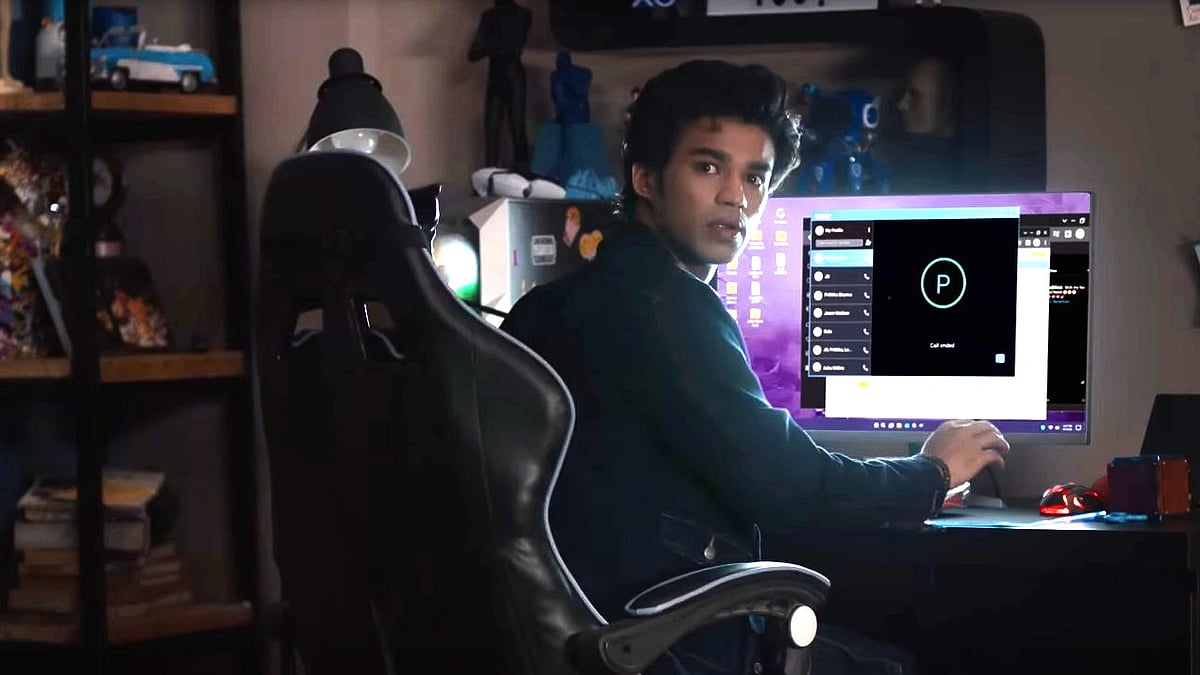Logout Review: Babil Khan Is the Highlight of This Sparingly Innovative Thriller
'Logout', starring Babil Khan, will release on Zee5 on 18 April.

advertisement
It feels like most of the formulas and tropes of a social media-oriented GenZ film have been tested – not because there isn’t anything left to say in the genre but mostly because there’s a lack of invention. Logout, starring Babil Khan, to its credit tries to do something different.
In Logout, Khan plays Pratyush Dua aka Pratman, who gained popularity for his ‘Laila-Majnu’ series where he plays both roles and supposedly has a loyal base of supporters. Pratyush and his manager JP have the social media influencer playbook memorized – Pratyush is the face of a vegan brand, he shows up in his female rival’s comment section advocating for #OnlineWomensSafety.
Pratman exists as a performance and yet, Pratyush spends so much time curating and growing that persona that the viewer can’t help but wonder where the two personalities diverge. That’s primarily why the camera stays on Pratyush practically the entire time – we see the face of a vegan brand order chicken, we see the champion of women’s safety log into his secret toxic incel account and call his rival “b**ch” whenever he’s upset.
His only connection to his family is his sister (an effective Rasika Dugal) and yet, he’s barely present in his interactions with her and even his niece (who he definitely cares about) becomes ‘content’ for him, the same way he has become ‘content’
But the film doesn’t just stay on his duality – most people know this simple fact and are aware of how social media, for most people, sways to the ‘reel’ side of ‘reel vs real’. Or one would assume. The film pushes the story to the next gear by introducing an ‘antagonist’ – Pratyush’s phone is stolen and he soon realises he’s being blackmailed by a ‘fan’.
The fan in question seems to have developed a parasocial relationship with the influencer – not an anomaly in the digital content space but can be dangerous all the same. The only issue with Logout so far is that the director, Amit Golani, doesn’t rely on subtlety as much he should. The heavy-handed quote the movie opens with – ‘it's a prison designed for your mind and it has over 7 billion prisoners. There's a reason it's called a 'cell' phone’ – is hint enough.
Babil Khan is the life and (non-CGI) blood of Logout and, in a way, there is no better actor for this role. Khan’s own social media persona could be a study in how mind-boggling the internet can be – for instance, he has become meme fodder for acting like a decent person.
So when the climax finally rolls by and you watch Pratyush become disillusioned with the system he helped create in the first place, it’s incredibly effective despite the fact that the last twenty minutes of the film disappoint by ultimately surrendering to genre conventions (that of a thriller, I’m not sure if we have a proper name for this social media-obsession-critique subgenre yet).
However, the film does have a basic understanding of all its moving parts – sometimes more than most films have had in the past. There’s no moment where Pratyush suddenly goes viral or multiple people get notifications that pushes the story forward. That in itself is refreshing to see. Like Ctrl, the main character’s fame is part of a sustained effort, not just a random one-shot viral video.
The way Pratyush digs out a relic – a landline phone – to try and find help but can’t seem to recall any numbers or when we get a glimpse into how many things in his life and his house can be controlled simply by having his phone in possession, the film is at its best.
Even the ‘fan’ doesn’t sound like a ‘villain’ – at least not in the typical Bollywood sense. If anything, she is a cautionary tale too – she exists in the space between real life and fiction, one where she had formed a one-sided relationship with not just a stranger, but the construct of a stranger. It’s difficult to actually ascertain where the fault stems from.
A lot of this set up and the way Khan practically goes through multiple stages of grief is terrifying enough – if the film wanted to be a sermon against the dangers of social media and relying on your device, that much is enough. That’s why it’s a pity that the makers don’t seem to trust that to be enough. So the story is pushed into familiar, predictable territory – adding tension that ends up being distracting.
On social media, even genuine emotions can be seen as gimmicks or marketing stunts and honestly, it’s difficult to place blame there either. With the anonymity that comes with a phone screen, people lose sight of accountability for their actions; they forget that a comment box is still attached to a human being. It’s all too artificial, too structured, and glittery.
Nobody can deny that the digital space is a dangerous place but this ‘danger’ and this reliance on social media is also far too complex for this film to capture. That being said, it would also be unfair to put that expectation on this film. One only notices the lack of complexity because of the aforementioned distraction.
Logout does most of its job and, for the most part, does so without being preachy. It doesn’t end on a super happy note and neither does it claim to have found the solution for it all. Unless you’d consider the title to be the solution in itself, one that’s far from possible but also one that seems far too enticing by the time the movie’s messaging sets in.